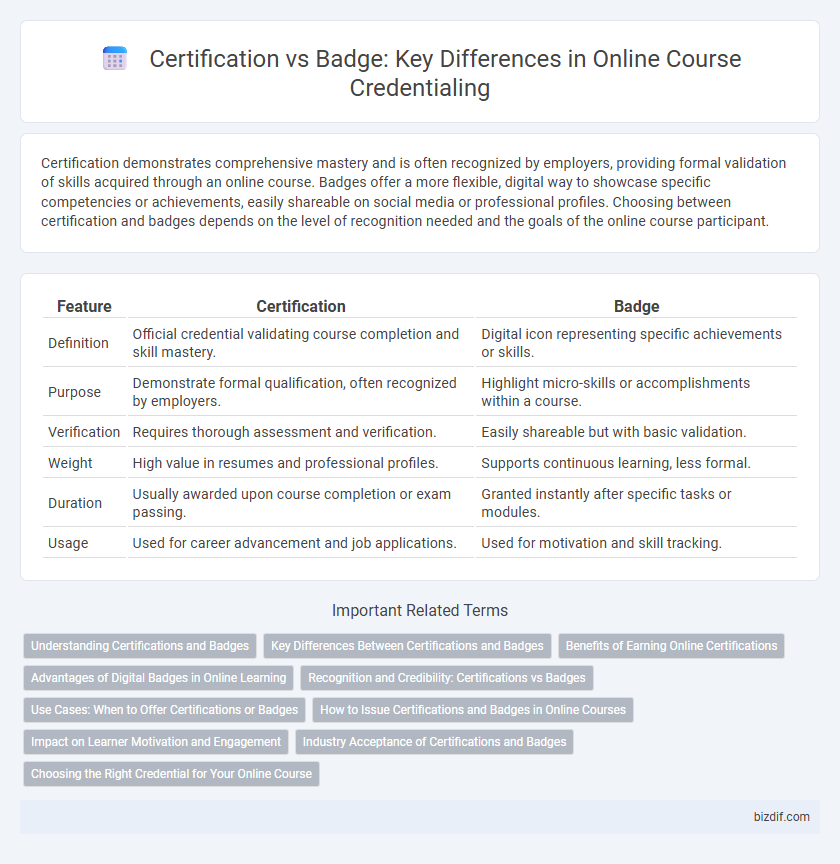Certification demonstrates comprehensive mastery and is often recognized by employers, providing formal validation of skills acquired through an online course. Badges offer a more flexible, digital way to showcase specific competencies or achievements, easily shareable on social media or professional profiles. Choosing between certification and badges depends on the level of recognition needed and the goals of the online course participant.
Table of Comparison
| Feature | Certification | Badge |
|---|---|---|
| Definition | Official credential validating course completion and skill mastery. | Digital icon representing specific achievements or skills. |
| Purpose | Demonstrate formal qualification, often recognized by employers. | Highlight micro-skills or accomplishments within a course. |
| Verification | Requires thorough assessment and verification. | Easily shareable but with basic validation. |
| Weight | High value in resumes and professional profiles. | Supports continuous learning, less formal. |
| Duration | Usually awarded upon course completion or exam passing. | Granted instantly after specific tasks or modules. |
| Usage | Used for career advancement and job applications. | Used for motivation and skill tracking. |
Understanding Certifications and Badges
Certifications represent formal recognition awarded upon successful completion of a comprehensive online course, often requiring rigorous assessment and proving mastery of specific skills or knowledge. Badges function as digital tokens signifying achievement of particular milestones or competencies within a course, offering micro-credentials that validate incremental learning progress. Understanding the distinction allows educators and learners to strategically choose between earning comprehensive certifications or accumulating badges that enhance professional profiles in online education platforms.
Key Differences Between Certifications and Badges
Certifications typically require comprehensive assessments and validate a learner's mastery of a subject, while badges represent specific skills or achievements within a course and are often earned through completing smaller tasks. Certifications usually involve formal evaluation by accredited institutions and provide recognized credentials that can enhance professional credibility. Badges are more flexible, portable, and shareable across online platforms, serving as micro-credentials that motivate continuous learning.
Benefits of Earning Online Certifications
Earning online certifications validates specialized skills and enhances professional credibility in competitive job markets. Certifications from accredited platforms increase employability by demonstrating mastery and commitment to continuous learning. Employers often prioritize certified candidates, leading to higher salary prospects and career advancement opportunities.
Advantages of Digital Badges in Online Learning
Digital badges offer a verifiable and shareable representation of skills and achievements, enhancing learner motivation and engagement. They provide micro-credentials that can be easily displayed on professional profiles, boosting employability and career advancement. Unlike traditional certifications, digital badges facilitate continuous learning by recognizing incremental progress and competencies in online courses.
Recognition and Credibility: Certifications vs Badges
Certifications offer formal recognition and higher credibility by validating comprehensive skills through standardized assessments, often issued by accredited institutions. Badges provide micro-credentials that acknowledge specific achievements or competencies, enhancing motivation but with less authoritative weight. Employers and learners tend to value certifications more for career advancement, while badges support ongoing skill development and digital portfolio building.
Use Cases: When to Offer Certifications or Badges
Certifications are ideal for professional courses that require formal recognition of skills and qualifications, such as IT, healthcare, or project management, enhancing resumes and career advancement. Badges work well for microlearning, skill-building modules, or participation acknowledgment, motivating learners through gamification and showcasing specific competencies on digital profiles. Offering certifications suits comprehensive learning paths with measurable outcomes, while badges fit shorter, modular courses focusing on incremental achievements.
How to Issue Certifications and Badges in Online Courses
Issuing certifications in online courses involves verifying learner completion and mastery through assessments before generating a digital or printable certificate with unique identifiers for authenticity. Badges are issued by embedding metadata compliant with standards like Open Badges, allowing learners to showcase specific skills or achievements on social profiles and learning platforms. Integrating automated issuance systems within Learning Management Systems (LMS) streamlines the process, enhancing credibility and engagement in online learning environments.
Impact on Learner Motivation and Engagement
Certification provides learners with formal recognition of skills mastery, often enhancing career prospects and increasing motivation through tangible achievements. Badges offer micro-credentials that promote continuous engagement by rewarding specific competencies or milestones within a course. Both tools drive learner motivation but certifications typically motivate through long-term goals, while badges foster sustained interaction and incremental progress.
Industry Acceptance of Certifications and Badges
Certifications are widely recognized and valued across industries for validating professional skills through rigorous assessments, often enhancing career advancement opportunities. Badges, while gaining popularity for micro-credentials and skill specialization, currently hold less weight in formal hiring processes compared to certifications. Employers typically prefer certifications due to their standardized criteria and broader industry acceptance as proof of competency.
Choosing the Right Credential for Your Online Course
Certification provides formal recognition of skill mastery through a rigorous assessment process, boosting learner credibility and employability in professional fields. Badges offer micro-credentials highlighting specific achievements or competencies, ideal for showcasing progress and motivating continued learning. Choosing between certification and badges depends on the course goals, target audience, and desired impact on learners' career advancement or personal development.
Certification vs Badge Infographic

 bizdif.com
bizdif.com